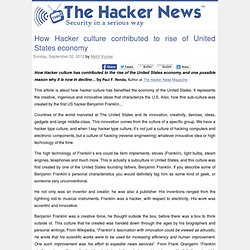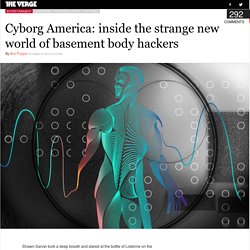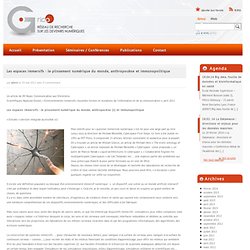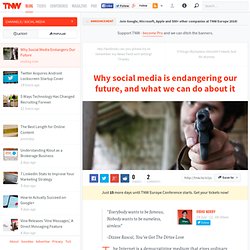

[EB] Secret Weapons, UFO, Conspiracy, Technology Video Colle. How Hacker culture contributed to rise of United States economy. How Hacker culture has contributed to the rise of the United States economy and one possible reason why it is now in decline… by Paul F.

Renda, Author at The Hacker News Magazine This article is about how hacker culture has benefited the economy of the United States. It represents the creative, ingenious and innovative ideas that characterize the U.S. Also, how this sub-culture was created by the first US hacker Benjamin Franklin... Countries of the world marveled at The United States and its innovation, creativity, devices, ideas, gadgets and large middle-class. The high technology of Franklin’s era could be farm implements, stoves (Franklin), light bulbs, steam engines, telephones and much more.
He not only was an inventor and creator, he was also a publisher. The Converged Media Imperative: How Brands Must Combine Paid, Owned... Berners-Lee: World Finally Realizes Web Belongs To No One. Sir Tim Berners-Lee, the father of the web.

Photo: Tony Scarpetta Sir Tim Berners-Lee is the reason you’re reading this story in a web browser, complete with hypertext like this and an internet address that looks like this: But you weren’t supposed to see the address. In building the first web browser at Switzerland’s CERN nuclear research lab in the early ’90s, the English-born Berners-Lee designed a system where only the technicians behind the scenes would see addresses.
The ordinary web user would only see text and hypertext, jumping from page to page without ever typing on a keyboard. “On the initial design of the web, you didn’t see the when you were a user. As the web grew, this particular vision was lost — at least in part. Cerf and Crocker are just two names on a long list of internet founding fathers. Basically, Berners-Lee took the idea of hypertext and applied it to the transfer control protocol (TCP) and domain naming system (DNS) that already underpinned the internet. Cyborg America: a journey into the world of basement body hackers. Shawn Sarver took a deep breath and stared at the bottle of Listerine on the counter.

“A minty fresh feeling for your mouth... cures bad breath,” he repeated to himself, as the scalpel sliced open his ring finger. His left arm was stretched out on the operating table, his sleeve rolled up past the elbow, revealing his first tattoo, the Air Force insignia he got at age 18, a few weeks after graduating from high school. Sarver was trying a technique he learned in the military to block out the pain, since it was illegal to administer anesthetic for his procedure. “A minty fresh feeling... cures bad breath,” Sarver muttered through gritted teeth, his eyes staring off into a void. Tim, the proprietor of Hot Rod Piercing in downtown Pittsburgh, put down the scalpel and picked up an instrument called an elevator, which he used to separate the flesh inside in Sarver’s finger, creating a small empty pocket of space. The implant stayed put the second time. “I’m a cyborg!” Video. Les espaces immersifs : le plissement numérique du monde, anthropocène et immunopolitique.
Un article de JM Noyer, Communication aux Entretiens Scientifiques Neptune,Toulon, « Environnements immersifs: nouvelles formes et mutations de l’information et de la communication », avril 2012 Les espaces immersifs : le plissement numérique du monde, anthropocène (1) et immunopolitique « Extraits » (version intégrale accessible ici) Mon intérêt pour la « question immersive numérique » est lié pour une large part au livre conçu sous la direction de Michael Benedikt, Cyberspace First Steps.

Ce livre a été publié en 1991 au MIT Press. Il comprenait 15 articles. Il existe une définition populaire ou doxique d’un environnement immersif numérique : « un dispositif, une scène ou un monde artificiel interactif créé par ordinateur et dans lequel l’utilisateur peut s’immerger ». Le jeu video comme pré-modèle immersif numérique. Les jeux video sont, de ce point de vue des bricolages pré-immersifs. Why Social Media Endangers Our Future. “Everybody wants to be famous,Nobody wants to be nameless, aimless”-Dizzee Rascal, You’ve Got The Dirtee Love The Internet is a democratizing medium that gives ordinary people the power to be content creators and information disseminators.

This point has been discussed to death on the vessels of that change – blogs and social media (journalists love nothing more than talking about journalism). On the flip-side of this, the Internet takes away power from people who do not create and do not create a virtual presence for themselves. If you can’t find someone or something on Google, it might as well not exist.
Therefore, entrepreneurs have found ways to give the power of content creation to as many people as possible, and have been rewarded handsomely. It’s easy to see that this is true; content creation and publication has become progressively more accessible. I think we can fix our algorithmically determined future by doing a couple of things. We can still fix this. Cyberspace, Virtual Reality, and Critical Theory.